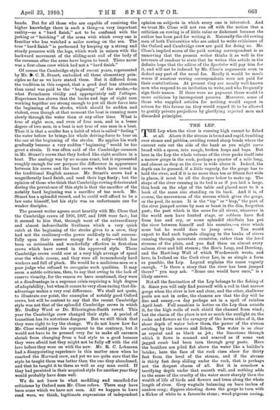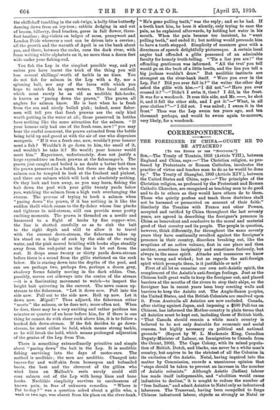THE LEP.
THE Lep when the river is running high cannot be fished at all. Above it the stream is broad and rapid, tumbling over stones and pebbles, swirling round sharp bends where the current eats out the side of the bank as you might carve bread with a spoon, into rough, broken loops and bays. But here in the Lep the whole volume of the river packs itself into a narrow gorge in the rock, perhaps a quarter of a mile long, and almost as deep as the river is wide above it. Indeed, the depth can be guessed, if a little vaguely, for the gorge has to hold the river, and if it is no more than ten or fifteen feet wide in places, it must be all the deeper below to make up. The shape of the river running in its bed is as if you laid a large, thin book on the edge of the table and placed next to it a book of the same size standing on its back. And it is, of course, the narrowness of the stream which gives the gorge, or the pool, its name. It is the "lep " or "leap," the part of the river jumped across by man or beast in the dim, forgotten past; the past which is the same for all rivers, wherever in the world men have hunted stags, or robbers have fled from hue and cry, or some splendid chieftain has put the river between himself and his enemies,—a river which none but he would dare to jump over. You would expect to find such legends clinging to the banks of rivers running through mountain countries, rather than the level streams of the plain, and you find them on almost every salmon river and hill stream ; the Roe's Leap, and Deerleap, and the Hart-leap Well of which Wordsworth wrote, and here, in Ireland on the Cork river Lee, in as simple a form as possible, the Lep. Legend explains the name vaguely enough. "Is there a story that the river has been jumped there ? " you may ask. " Some one would have once," is a likely answer.
Not all the fascination of the Lep belongs to the fishing of it. Since you will only find yourself with a rod in that narrow gorge when the river is low and clear, and the other, shallower pools are not in order, the chances are that the day will be fine and sunny,—a day perhaps set in a spell of rainless April heat. Full sunshine is hotter on the Lep than outside it, for the high walls of rock shield the channel from wind ; but the charm of the place is not so much the sunlight on the rocks and flowers as the savagery of the hewn sides of it, the sheer depth of water below them, the power of the stream swirling by the mosses and lichen. The water is as clear as crystal and as black as jet; the limestone through which it flows is seamed and scarred as if some vast jagged comb had been torn through grey paste. Here the boulders are piled fiat above the water like a builder's bricks; here the face of the rock rises sheer for thirty feet from the level of the stream, and if the stream is thirty feet deep sliding under the rock, that is perhaps not the deepest chasm of all. But it is somehow a terrifying depth under that smooth wall, and nothing adds to the sense of the cruelty of the water more sharply than the wealth of life of birds and flowers and trees along the whole length of river. Grey wagtails balancing on bare inches of sunken crag ; dippers shooting down the gorge to turn with a flicker of white to a favourite stone ; wood-pigeons cooing, the chiffchaff tumbling in the oak-twigs, 'a holly-blue butterfly dancing down from an ivy-tree ; rabbits dodging in and out of broom, bilberry, dead bracken, gorse in full flower, three- foot heather; dog-violets on ledges of moss, pennywort and London Pride wherever a root can be driven into a crevice ; all the growth and the warmth of April is on the bank about you, and there, between the rocks, runs the dark river, with foam writing white alphabets on it, no more than a dozen feet wide under your fishing-rod.
You fish the Lep in the simplest possible way, and yet unless you have learnt the trick of the thing you will lose several shillings'-worth of tackle in no time. You do not fish for salmon in the Lep with a fly, nor a spinning bait, nor any of the lures with which you hope to catch fish in open waters. The local method, which must surely be as old as neolitbic fish-hooks, is known as "pacing down the prawn." The prawn all anglers for salmon know. He is best when he is fresh from the sea and nicely boiled pink ; indeed, some fisher- men will tell you that fresh prawns are the only kind worth putting in the water at all; those preserved in bottles have nothing like the same attraction for the salmon. "If your honour only had one of the fresh ones, now ! " you may bear the rueful comment, the prawn extracted from the bottle being held up and gazed at with the air of one who dispraises mongrels. " If it was a fresh one, now, wouldn't your honour meet a fish ? Wouldn't it go down to him, the smell of it, and wouldn't he take it ? He would; your honour would meet him." Experience, unfortunately, does not justify a Large expenditure on fresh prawns at the fishmonger's. The prawn just caught and boiled is no doubt a better bait than the prawn preserved in a bottle, but there are days when no salmon can be tempted to look at the freshest and pinkest, and there are salmon which will look at absolutely nothing. Or they look and turn away, as you may learn, fishing the bait down the pool with your gillie twenty yards below you, watching the salmon from a high rock overhanging the stream. The process of trying to hook a salmon when " pacing down" the prawn, if it has nothing in it like the sudden thrill which comes to the fly-fisher whose line plucks and tightens in mid-stream, still can provide some pretty exciting moments. The prawn is threaded on a needle and harnessed to a flight of hooks by fine copper- wire, the line is shotted carefully so as to sink the bait to the right depth and still to allow it to travel with the current down-stream, the fisherman takes up his stand on a ledge of rock by the side of the racing water, and the pink morsel bristling with hooks slips steadily away from the rod-point as the line is let out from the reel. It drops some twenty or thirty yards down-stream before there is a sound from the gillie stationed on the rock below. He is staring down into the depths of the pool, and can see perhaps two, perhaps five, perhaps a dozen grey, shadowy forms faintly moving in the dark eddies. One, possibly, moves out sideways into the centre of the stream —it is a fascinating movement to watch—to inspect the bright bait quivering in the current. The news comes up- stream to the fisherman. " Let it down now. Pull into the side now. Pull out to the side now. Roll np now. Let it down now. .Migod!" Thus adjured, the fisherman either " meets " the salmon, or he does not; more often not. When he does, there may be a very exciting and rather perilous ten minutes or quarter of an hour before him, for if there is one thing he cannot do with sheer rock above him, it is to follow a hooked fish down-stream. If the fish decides to go down- stream, he must either be held, which means strong tackle, or he will break the hold, which means prolonged adjuration of the genius of the Lep from Tim.
There is something extraordinarily primitive and simple about " pacing down" the bait in the Lep. It is neolithic fishing surviving into the days of motor-cars. The method is neolithic ; the men are neolithic. Changed into beaver-fur and wolf-skin from homespun and hobnailed boots, the best and the cleverest of the gillies who wind lines on Malloch's reels surely could still coax salmon out of the Lep with hemp lines and bone hooks. Neolithic simplicity survives in carelessness of known pain, in fear of unknown remedies. " Where is Pat to-day ? " was a question asked about a gillie who, a week or two ago, was absent from his place on the river-bank.
" He's gone pulling teeth," was the reply; and so he had. If a tooth hurt him, he bore it silently, only trying to ease the pain, as he explained afterwards, by holding hot water in his month. When the pain became too insistent, he " went pulling teeth," and ended it; but nothing would persuade him to have a tooth stopped. Simplicity of manners goes with a directness of speech delightfully picturesque. A certain local angler had offended a gillie possessed of an admirable faculty for homely truth-telling. "'Tis a liar you are !" the offending gentleman was informed. "All the trut' you tell would go on the back of a little beetle, and the lies you tell a big jackass wouldn't draw." But neolithic instincts are strongest on the river-bank itself. " Were you ever in the Lep, Pat ? Did you ever fall in ? " the writer the other day asked the gillie with him.—"I did not."—" Have you ever crossed it? "—" Didn't I swim it, then? I did, in the frost. It was for a woodcock. It rose this side, and Mr. —, he shot it, and it fell the other side, and I got it."—"What, in all your clothes ?"—" I did not. I was naked ; I swam it in the frost." Thus was the Lep swum ten years ago, and ten thousand perhaps, and would be swum again to-morrow, very likely, for a woodcock.















































 Previous page
Previous page